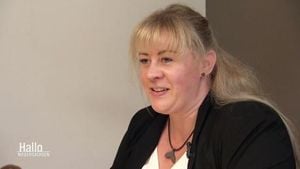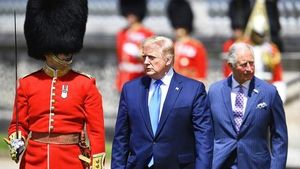The world is facing climate challenges like never before, and Pacific Island nations are at the heart of the struggle against rising sea levels. Countries such as the Republic of the Marshall Islands, Kiribati, Tuvalu, and Palau are grappling with the reality of being among the most vulnerable nations on the planet due to their low-lying geography. Their existence is on the line as these islands hover perilously close to being swallowed by the ocean.
Recent discussions at the United Nations Climate Conference, known as Cop28, highlighted the escalating threat of rising sea levels, with forecasts warning of significant temperature increases by 2100. The stakes couldn’t be higher for these fragile island nations. Palau’s President Surangel Whipps Jnr underscored this point by stating, "Three degrees is catastrophic for small islands." This alarming prospect illustrates just how precarious the situation has become for communities who often lack the means to shield themselves from such drastic environmental changes.
Kiribati, Tuvalu, and the Marshall Islands are especially highlighted as potentially being entirely inundated, which raises the question—what will happen to the people, their cultures, and their ancestral lands? With the majority of these islands being less than two meters above sea level, the risks are not merely theoretical; they’re imminent. President Whipps emphasized, "Tuvalu, Marshall Islands, Kiribati, none of their islands are above two metres." This stark reality showcases the urgent need to act before it's too late.
Another reality facing these Pacific communities is the cultural impact of climate change. Whipps expressed his concern over the loss of cultural heritage stating, "The reality is those islands have chiefs, languages, history, and culture. We talk about the turtles disappearing, but what about the culture, what about the history disappearing?" This sentiment hits home, as climate change not only threatens environmental stability but the very essence of what it means to belong to these islands.
The Cop28 conference did manage to make strides toward acknowledging the need for transitioning from fossil fuels. For the first time, the conference adopted language indicating the need to accelerate action within this critical decade to achieve net-zero carbon emissions by 2050. Yet, the outcome was far from perfect. Key players, particularly oil-producing nations, softened critical commitments. The text, though improved, avoided setting firm deadlines on fossil fuel phase-outs, raising the ire of many participants fighting for urgent climate action.
During the talks, Samoa’s lead negotiator Anne Rasmussen criticized the conference results, pointing out, "We do not see any commitment to peak emissions by 2025." Despite referencing scientific consensus, the lack of decisive action frustrates those who feel the world should not miss the opportunity to address climate change head-on.
Voices from Pacific nations grew increasingly urgent as they laid out the dire consequences they face, including saltwater intrusion, eroded coastlines, and homes overwhelmed with floodwaters. Palau resident Bernie Ngiralmau articulated the challenges her country faces, highlighting, "We have saltwater intrusion and inundation in our taro patches; coastlines are being eroded, and homes are flooded twice monthly due to sea level rise." Through these lived experiences, the realities of climate change become all too clear.
The Global Centre for Climate Mobility has been mapping areas most susceptible to climate change, and their findings confirm the fears of island nations being nearly drowned by rising tides. The challenges to these communities include not only diminished land but also threats to livelihoods and cultural heritage. Ginger Cruz, a professor of U.S. foreign policy at the University of Guam, reflected, "What feels like a small difference to the rest of the world is magnified in the Pacific Islands. Inches from extinction are some of the most beautiful places and cultures, which are being held hostage by global economic calculations." This perspective urges the world to realize the urgency of the crisis facing these communities.
Further complicate the situation is the growing intensity of extreme weather events, such as tropical cyclones. This year, back-to-back cyclones, Judy and Kevin, devastated Vanuatu, leaving destruction and chaos. The climate crisis does not merely bring rising waters; it intensifies natural disasters, making the stakes even higher for already vulnerable island communities.
At Cop28, some commitments were made, particularly to assist Pacific nations with US$225 million pledged to help protect about 30 percent of the Pacific region. The Global Environment Facility contributed US$125 million, and the Bezos Earth Fund added US$100 million aimed at assisting with Marine Protected Areas. While these commitments are promising, many experts argue they simply fall short of the broader needs of the Pacific islands. Professor Meg Keen, from Australia’s Lowy Institute, pointedly remarked, "The commitments do notensure climate action and finances will be sufficient to meet Pacific islands’ needs." This sentiment captures the disappointment felt across the region.
While the pledges to expand renewable energy and lessen reliance on fossil fuels are welcome, many onlookers and experts agree they lag significantly behind what is necessary to avert calamity. Keen shared, "It is not whether or not it is a ‘setback,’ the key point is, it is not an adequate step forward." Hopes for meaningful commitments were dashed as Pacific nations felt their needs were left out of the final agreements at Cop28.
Even amid these discouraging discussions, the resilience of Pacific Islanders shines through. Many are actively working to adapt and face challenges head-on. The Marshall Islands’ delegation, led by John Silk, echoed this determination, expressing frustration yet resolve. He stated, "I came here to build a canoe together... We have built a canoe with a weak and leaky hull, full of holes. Yet we have to put it in the water because we have no other option." Sardonic yet poignant, Silk’s quote embodies the fighting spirit of those affected, with no choice but to navigate the treacherous waters of climate change.
Experts warn of the potential domino effect these climate challenges will have on societies and economies across the Pacific, with significant geopolitical ramifications as countries struggle to cope. Keen noted, "Many of these countries are already in debt distress, and another significant climatic event will add to economic strains and instability." This risk of instability dovetails with concerns about climate migration, which is already occurring as communities seek refuge from rising tides, potentially boiling tensions over land and resources.
Everyday life illustrates the stark reality of climate change for Pacific Islanders. Anil Prasad, who operates small tours in Fiji, expressed the frustrations faced by those wishing to shift to environmentally friendly electric vehicles—concerns about inadequate infrastructure cast shadows on future efforts. He mentioned, "We want to get away from petrol and have more electric vehicles, but there are nearly no charging stations. What if you run out of power in the jungle?" This situation embodies the broader struggles of Pacific communities attempting to adapt to changing circumstances, begging the question of how much support will truly come from the global community.
The urgency is palpable, as each moment wasted could mean more harm to ecosystems, cultures, and lives. Whipps Jnr of Palau, when reflecting on coral reefs, noted, "With the heat, it’s going to kill corals through coral bleaching. We know we are going to lose 40 percent of our fish stock." This hit home, stressing the first-hand impacts of climate change as the delicate balance of ecosystems hangs by the thread.
To combat these compounding crises, global community action is required. The World Bank, among other organizations, emphasized the importance of scaling up investments aimed at tackling climate change impacts and supporting atoll nations and small island developing states (SIDS) as they navigate the myriad challenges presented. Urging for swift action, experts champion the need for focused efforts to build resilience and adaptability.
Given the interconnected challenges they face, from socio-economic issues to legal questions around maritime rights and environmental degradation, it becomes evident the world bears responsibility for ensuring these islands don’t fade from existence. With the pressure mounting, the question remains—what will be done to assure the survival of these beautiful island cultures, when tomorrow may already be too late?



